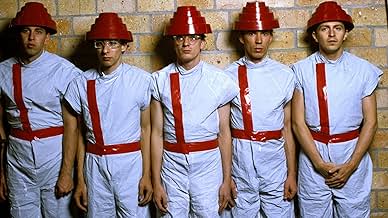Devo
- 2024
- 1h 34m
In 1980, new wave band Devo scored a hit with "Whip It" and gained mainstream success with their message of societal "de-evolution", formed in response to the 1970 Kent State shootings.In 1980, new wave band Devo scored a hit with "Whip It" and gained mainstream success with their message of societal "de-evolution", formed in response to the 1970 Kent State shootings.In 1980, new wave band Devo scored a hit with "Whip It" and gained mainstream success with their message of societal "de-evolution", formed in response to the 1970 Kent State shootings.
- Awards
- 1 win & 1 nomination total
Gerald Casale
- Self - Devo
- (as Jerry Casale)
Robert Mothersbaugh
- Self - Devo
- (as Bob Mothersbaugh)
Bob Casale
- Self - Devo
- (archive footage)
- (voice)
Jim Mothersbaugh
- Self - Devo
- (archive footage)
Alan Myers
- Self - Devo
- (archive footage)
- (voice)
Elliot Roberts
- Self - Devo's Manager
- (archive footage)
John F. Kennedy
- Self - 35th President of the United States
- (archive footage)
Richard Nixon
- Self - 37th President of the United States
- (archive footage)
Jimmy Carter
- Self - 39th President of the United States
- (archive footage)
Ronald Reagan
- Self - 40th President of the United States
- (archive footage)
Allison Krause
- Self - Killed at Kent State Anti-War Protest
- (archive footage)
Jeffrey Miller
- Self - Killed at Kent State Anti-War Protest
- (archive footage)
Bob Lewis
- Self - Early Collaborator
- (archive footage)
- (voice)
Ernest Angley
- Self - Christian Evangelist
- (archive footage)
David Bowie
- Self - Singer-Songwriter
- (archive footage)
Richard Branson
- Self - Entrepreneur
- (archive footage)
Featured reviews
Devo was a fun, adventurous band with a talent for mixing innovative sounds and vision with a commercial appeal that spread across a tumultuous decade or so.
Devo's catalog is rich and tuneful, despite the surface weirdness. The band wasn't just keenly talented musically, they brought a wit and an intellectual heft that was sorely needed in the music industry.
Casale seems to be the genius behind it all with Mothersbaugh right up there. But it's Casale's and Motherbaugh's never-ending complaining about the commercialization of the music industry and how Devo were poor, innocent lambs, victims of not just the piranha-like music industry but of America itself that disappointed me.
It's obvious Devo were masters at commercializing their product, even placing marketing/product paraphernalia inside albums. Instead of being the victims of commercialization, Devo were experts at sucking out the money from everything they touched/touch.
Funny that they whine so much while both Casale and Mothersbaugh continue to become richer and richer in the film industry while the legend of Devo continues to grow.
A fine documentary, as enjoyable as the band, but Devo sometimes come across today as too 21st century, too privileged and entitled with wealth, reminding one of Trump or Musk, playing the victim while enriching themselves.
Devo's catalog is rich and tuneful, despite the surface weirdness. The band wasn't just keenly talented musically, they brought a wit and an intellectual heft that was sorely needed in the music industry.
Casale seems to be the genius behind it all with Mothersbaugh right up there. But it's Casale's and Motherbaugh's never-ending complaining about the commercialization of the music industry and how Devo were poor, innocent lambs, victims of not just the piranha-like music industry but of America itself that disappointed me.
It's obvious Devo were masters at commercializing their product, even placing marketing/product paraphernalia inside albums. Instead of being the victims of commercialization, Devo were experts at sucking out the money from everything they touched/touch.
Funny that they whine so much while both Casale and Mothersbaugh continue to become richer and richer in the film industry while the legend of Devo continues to grow.
A fine documentary, as enjoyable as the band, but Devo sometimes come across today as too 21st century, too privileged and entitled with wealth, reminding one of Trump or Musk, playing the victim while enriching themselves.
Wow!!! Did I learn a lot about DEVO!!
I was unaware they were actually highly intelligent people trying to give a message politically to us all!!
So many people who were influenced by them and inspired by their music being it controversial mongoloid etc. Didn't know David Bowie had anything to do with them either.
I thought so many of their songs were great and real catchy and still get a buzz out of hearing them. Also now know why MTV do not play their music (didn't in the 80's) and haven't seen them since so that goes to show Sadly 2 of the four have died at a fairly youngish age but the 2 telling the story are fascinating to listen you.
I was unaware they were actually highly intelligent people trying to give a message politically to us all!!
So many people who were influenced by them and inspired by their music being it controversial mongoloid etc. Didn't know David Bowie had anything to do with them either.
I thought so many of their songs were great and real catchy and still get a buzz out of hearing them. Also now know why MTV do not play their music (didn't in the 80's) and haven't seen them since so that goes to show Sadly 2 of the four have died at a fairly youngish age but the 2 telling the story are fascinating to listen you.
This documentary tells Devo's story to the drum beat of Devo. It stays true to the Devo's creative, brilliant and very quirky traits.
The story is mostly told by leading band members Mark Mothersbaugh and Gerald Casale. A lot of stuff they talk about would be known to Devo fans, maybe some stories were new or defined better. They talk about their evolution from art students to bumbling musicians and how they came up with the raw Devo concept.
Right from the start Devo were very cynical and frustrated with the world, and stayed that way throughout their Devo journey. I'm not sure if they ever really thought they would alert the world and change it for the better. They take you through their clumsy early years as a band during the early to mid 1970's playing in small clubs and getting booed. Then in 1978 they gain a huge audience by playing on a TV show. A couple of years later Devo peaked with their hit song Whip it, and with some frustration they slowly faded away. Devo were innovative and excellent musicians tight and sharp, but the documentary doesn't give too much credit to this.
Once again, the documentary confirms that it is very difficult to put Devo into a musical genre, they just don't really fit anywhere. Once you see this documentary you might understand why. If you were/are a fan of Devo you should enjoy this. If you don't know or understand what Devo was all about, this might confuse you more!
As a teenager, I first heard Devo's music in 1978. I didn't know what I was listening to, but I liked it. I was drifting away from pop music and needed something else. Devo was a total different world of music. Tell people you liked Devo and most people would roll their eyes.
The story is mostly told by leading band members Mark Mothersbaugh and Gerald Casale. A lot of stuff they talk about would be known to Devo fans, maybe some stories were new or defined better. They talk about their evolution from art students to bumbling musicians and how they came up with the raw Devo concept.
Right from the start Devo were very cynical and frustrated with the world, and stayed that way throughout their Devo journey. I'm not sure if they ever really thought they would alert the world and change it for the better. They take you through their clumsy early years as a band during the early to mid 1970's playing in small clubs and getting booed. Then in 1978 they gain a huge audience by playing on a TV show. A couple of years later Devo peaked with their hit song Whip it, and with some frustration they slowly faded away. Devo were innovative and excellent musicians tight and sharp, but the documentary doesn't give too much credit to this.
Once again, the documentary confirms that it is very difficult to put Devo into a musical genre, they just don't really fit anywhere. Once you see this documentary you might understand why. If you were/are a fan of Devo you should enjoy this. If you don't know or understand what Devo was all about, this might confuse you more!
As a teenager, I first heard Devo's music in 1978. I didn't know what I was listening to, but I liked it. I was drifting away from pop music and needed something else. Devo was a total different world of music. Tell people you liked Devo and most people would roll their eyes.
I was a fan of Devo and always thought they were a fun band. Them now trying to make it sound like they were making important statements over cheesy synth riffs is just amusing to me. To most people they were a one hit wonder with 'Whip it'
I liked a few more of their songs but never once thought 'wow what great social commentary'. For that I was listening to the Clash and the Jam and many other bands of that era.
Don't get me wrong: music with a message like Devo's remains important for its subversive qualities, but this documentary doesn't exactly avoid backfiring with self-indulgence and potential hypocrisy.
Yes, mindless consumerism and toxic capitalism is bad, but the same society they lampoon has awarded them a career. They know this (the doc nods to it in the second half) and while they're by no means the most shameless paradox in music (looking at you, Rage Against The Machine), you still can't help but cringe at the bigger picture unfolding in front of you with this film: privileged Me Generation ultimately changed nothing with their complaining and became the system they hated at varying degrees.
Especially when, during one particular archived interview, the members basically concede their pleasure in profiting from their fans and justifying it by audience numbers... the same logic used by their corporate and government peers.
Another flaw: the lack of insight to their core musicality. Mostly the film likes to cover social and thematic aspects of Devo, but almost no insight is offered about their actual music, the equipment, the historical place they have during post-punk and onward.
Devo's place in pop culture shouldn't be undercut but it also shouldn't be overstated. Ethos aside, in the greater story of music, they are still mostly that one-hit wonder band that made "Whip It". This doc tries to walk the middle-ground but can't totally get away with what it's trying to do, and frankly it's on the fringes of a puff piece.
Yes, mindless consumerism and toxic capitalism is bad, but the same society they lampoon has awarded them a career. They know this (the doc nods to it in the second half) and while they're by no means the most shameless paradox in music (looking at you, Rage Against The Machine), you still can't help but cringe at the bigger picture unfolding in front of you with this film: privileged Me Generation ultimately changed nothing with their complaining and became the system they hated at varying degrees.
Especially when, during one particular archived interview, the members basically concede their pleasure in profiting from their fans and justifying it by audience numbers... the same logic used by their corporate and government peers.
Another flaw: the lack of insight to their core musicality. Mostly the film likes to cover social and thematic aspects of Devo, but almost no insight is offered about their actual music, the equipment, the historical place they have during post-punk and onward.
Devo's place in pop culture shouldn't be undercut but it also shouldn't be overstated. Ethos aside, in the greater story of music, they are still mostly that one-hit wonder band that made "Whip It". This doc tries to walk the middle-ground but can't totally get away with what it's trying to do, and frankly it's on the fringes of a puff piece.
Did you know
- TriviaDevo (via Mark Mothersbaugh) earns approximately $1 million annually from "Uncontrollable Urge," thanks to its long-standing role as the theme for MTV's "Ridiculousness."
- Quotes
Mark Mothersbaugh: And after the set was over, Bowie came backstage, and he said he'd like to produce us. We're like, "Sounds good to us, because we're sleeping in an Econoline van tonight."
- ConnectionsFeatures Island of Lost Souls (1932)
- Soundtracks(I Can't Get No) Satisfaction
Performed by Devo
Details
- Release date
- Countries of origin
- Language
- Also known as
- Devo: La banda más incomprendida de EE.UU.
- Production companies
- See more company credits at IMDbPro
- Runtime
- 1h 34m(94 min)
- Color
Contribute to this page
Suggest an edit or add missing content








































